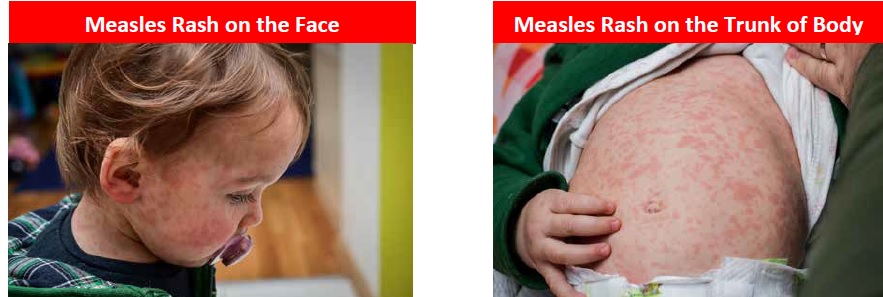The United States is on track to experience the largest outbreak of measles since health officials declared the disease eliminated from the country in 2000. Here’s what you need to know to keep you and your family protected.
What is measles?
Measles is a highly contagious viral disease that causes fever and a rash. If one person has it, 90% of people around them will also get it if they are not immune.
Who is at risk?
Anyone who is not vaccinated/immune can get measles at any age. Children younger than 5, adults older than 20, pregnant women, and immunocompromised persons are at most risk of serious complications form measles such as pneumonia and encephalitis.
How is measles spread?
The measles virus lives in an infected person’s nose and throat mucus. When that person sneezes or coughs, the virus sprays into the air and others can breathe it in. The virus remains active and contagious in the air for up to two hours.
What are the symptoms of measles?
Early symptoms include fever (which can reach 103 to 105 degrees F), cough, runny nose and red, watery eyes. Three to five days after symptoms start, a rash of red spots appears on the face and then spreads over the entire body.

Is there a vaccine to prevent measles?
Yes. Anyone born after January 1, 1957, who has not received two doses of a measles-containing vaccine or does not have a blood test proving that they are already immune to measles, should receive two doses of MMR (Measles, Mumps and Rubella) vaccine.
Do I need an additional measles vaccine?
Most people do not need an additional vaccine because they have immunity to measles either through immunization or previous infection. The two MMR shots are considered full immunization for life, and no additional vaccination is needed.
However, babies between 6 - 11 months of age who live in or are travelling to an area where a measles outbreak is occurring or outside of the U.S. should receive one dose of the MMR vaccine. All travelers to outbreak settings or internationally are recommended to have immunity against measles, which is either written documentation of adequate MMR vaccination, laboratory evidence of measles immunity or prior disease, or birth before 1957.
Also, adults who were immunized between 1963 and 1967 received a less effective vaccine than the one given now. If you were vaccinated for measles during this time period, it is recommended that you get at least one dose of the current MMR vaccine.
Where can I get vaccinated for measles?
The MMR vaccine, along with other routine vaccinations such as varicella (chickenpox), hepatitis, diphtheria, tetanus, pertussis (whooping cough) HPV and meningitis are available at health care provider offices and pharmacies.
The Westchester County Health Department provides FREE vaccines to uninsured and underinsured children and adults. Call us at (914) 995-5800 to find out if you are eligible and to make an appointment.
Resources
What is Measles (WCDH)
Questions & Answers About Measles (WCDH)
Measles Update (NYSDOH)
Measles (Mayo Clinic)
Measles Cases and Outbreaks (CDC)
